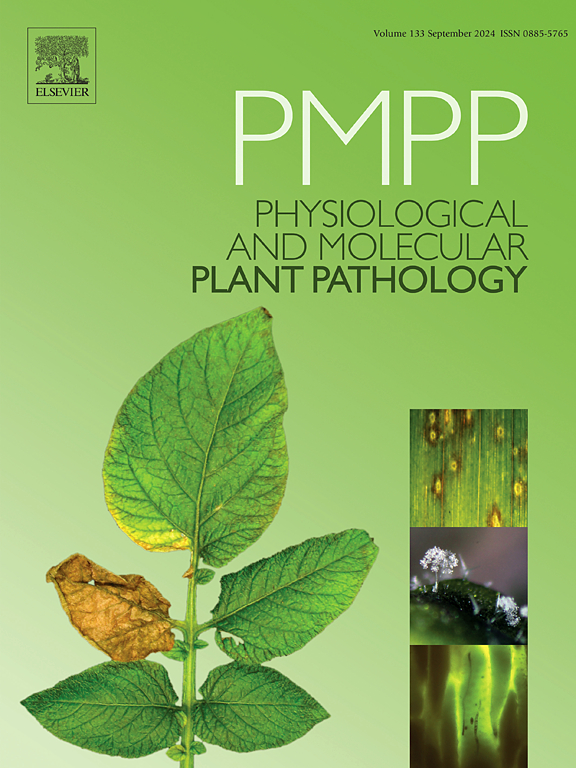Enhanced secondary metabolite accumulation in tomato roots mediated by colonization of Paenibacillus dendritiformis confers crop protection against foot rot caused by Rhizoctonia solani
IF 2.8
3区 农林科学
Q2 PLANT SCIENCES
引用次数: 0
Abstract
Leveraging the dynamic and adaptable ecological environment of the plant rhizosphere, characterized by intense microbe-plant interactions, mediated by plant secondary metabolites, can sustain and enhance plant development. This study evaluates the potential of rhizosphere bacteria to protect tomatoes against foot-rot disease caused by Rhizoctonia solani (MTCC 12232). The optimal spore-forming soil bacterium, Paenibacillus dendritiformis (PD), isolated from the tomato rhizosphere, demonstrated significant antifungal activity, inhibiting fungal growth by 76.94 % and reducing fungal biomass by 83.69 %. Treatment with PD effectively controlled foot-rot disease, lowering its incidence to 16.2 %. Furthermore, bacterial treatments improved tomato plant root establishment, elongation, and phytohormone production, boosting seed germination to 87 %. The study shows that P. dendritiformis can trigger non-specific immune responses in colonized plants, resulting in higher levels of mycolytic glucanase and chitinase enzymes in infected roots, along with increased accumulation of peroxidase and polyphenol oxidase enzymes. These findings highlight the potential of P. dendritiformis as a viable biocontrol agent for environmentally friendly crop protection and production, with future studies aimed at field trials across diverse locations to validate and optimize its efficacy in various agricultural settings.
树突状芽孢杆菌定植介导番茄根系次生代谢物积累增强,可防止番茄根丝核菌引起的足腐病
利用植物根际动态、适应性强的生态环境,以植物次生代谢物为媒介,以微生物与植物的强烈相互作用为特征,可以维持和促进植物的发育。本研究评价了番茄根际细菌防治番茄枯丝核菌(MTCC 12232)引起的番茄足腐病的潜力。从番茄根际分离得到的树状拟芽孢杆菌(Paenibacillus dendritiformis, PD)具有显著的抗真菌活性,抑制真菌生长76.94%,减少真菌生物量83.69%。PD治疗能有效控制足腐病,使其发病率降至16.2%。此外,细菌处理改善了番茄植株的根系建立、伸长和植物激素的产生,使种子发芽率提高到87%。研究表明,树突状假单胞菌可以在定植植物中引发非特异性免疫反应,导致感染根中霉菌酵素葡聚糖酶和几丁质酶水平升高,同时过氧化物酶和多酚氧化酶积累增加。这些发现突出了树形假葡萄球菌作为一种可行的环境友好型作物保护和生产生物防治剂的潜力,未来的研究旨在在不同地点进行田间试验,以验证和优化其在各种农业环境中的功效。
本文章由计算机程序翻译,如有差异,请以英文原文为准。
求助全文
约1分钟内获得全文
求助全文
来源期刊
CiteScore
4.30
自引率
7.40%
发文量
130
审稿时长
38 days
期刊介绍:
Physiological and Molecular Plant Pathology provides an International forum for original research papers, reviews, and commentaries on all aspects of the molecular biology, biochemistry, physiology, histology and cytology, genetics and evolution of plant-microbe interactions.
Papers on all kinds of infective pathogen, including viruses, prokaryotes, fungi, and nematodes, as well as mutualistic organisms such as Rhizobium and mycorrhyzal fungi, are acceptable as long as they have a bearing on the interaction between pathogen and plant.

 求助内容:
求助内容: 应助结果提醒方式:
应助结果提醒方式:


